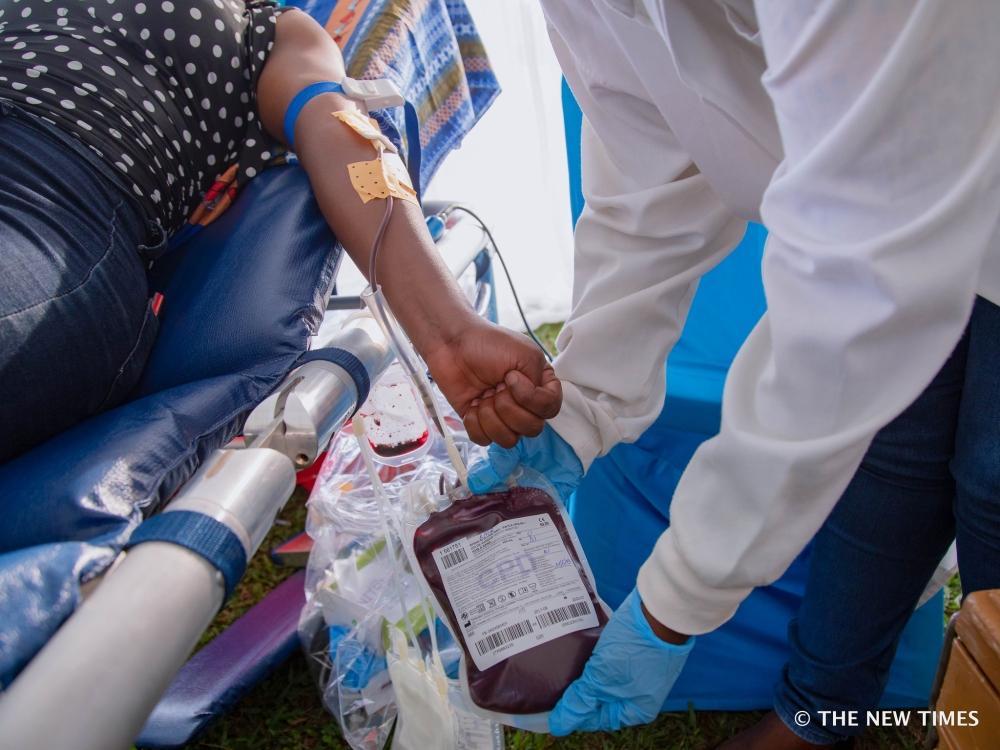Africa-Press – Rwanda. Booking a blood donation in Rwanda no longer requires one to wait for hours on long queues. With the click of a button, voluntary donors can now schedule appointments and hospitals can track supplies instantly, thanks to a digital system rolled out by Rwanda Biomedical Centre (RBC).
The platform is changing how blood is collected, tested, and delivered.
In 2023, Rwanda Biomedical Centre, through its Blood Transfusion Division (BTD), launched the Blood Bank Management System (BBMS), an online platform that links all 30 districts, five regional blood centres, four national referral hospitals, and 80 public and private health facilities across the country. The Blood Bank Management System is a comprehensive digital platform – a software system – developed to streamline the processes of blood collection, storage, distribution, and donor-recipient matching.
Dr. Thomas Muyombo, the Director of the Regional Center for Blood Transfusion in Kigali, said the BBMS allows donors to register and book appointments online, reducing waiting time and making the donation process more convenient and efficient.
“This system is internet-based. So, donors can access it anywhere, whether in urban or rural areas,” he explained.
According to the BTD’s 2023 annual report published last year, Rwanda collected 86,812 units of blood in 2023, up from 78,838 units in 2022. This explains the 8.7 donations per 1,000 people, nearing the World Health Organization’s (WHO) recommended target of 10 donations per 1,000 people.
Dr Muyombo noted that the main feature of the BBMS is real-time tracking of blood stocks, noting that every donation or transfusion is immediately recorded, giving hospitals and blood centres an accurate, up-to-date picture of available supplies.
“This data enables quick transfers between facilities, particularly during shortages, and helps prioritise the use of blood nearing expiration to minimise waste.”
In 2023, the BBMS helped the Blood Transfusion Division fulfil 121,974 out of 122,628 blood requests, a 99.47% fulfillment rate. The division set an ambitious target to reach full fulfillment this year.
He stated that blood donation eligibility guidelines are for most healthy individuals aged 18 to 60 years and weighing over 50 kilogrammes who are eligible to donate. Regular donors can give blood every 56 days, while platelet donors can donate every 14 days, up to 24 times a year.
Factors such as recent travel, medication, pregnancy, or surgery may affect eligibility.
In May 2024, RBC launched a partnership with Irembo, Rwanda’s leading e-government platform, to enhance blood donation services further.
“The collaboration is aimed at improving access to advanced blood testing and making it easier for donors to schedule appointments through digital platforms,” Dr. Muyombo said.
Through the Irembo partnership, donors gain access to comprehensive testing, including blood grouping, antibody screening, and tests for HIV, Hepatitis B and C, Syphilis, and Coombs. Test results are generally available within one day to one week, depending on the tests performed, he added.
Dr. Muyombo noted that while all blood groups are collected based on hospital demand, Rh-negative types are often in shorter supply due to their high demand and compatibility with both Rh-negative and Rh-positive patients.
“Blood group quantities vary with transfusion demands, but we rely on data-driven strategies to ensure timely availability of requested units,” he added.
The system helps track blood stocks in real time and sends alerts when levels fall too low, allowing the Blood Transfusion Division to respond quickly by reaching out to specific donors.
“To strengthen this effort, a call centre aimed at improving donor engagement and recruitment is expected to be established, and more strategies are still in the pipeline.”
Inkuru Nziza Orthopedic Specialized Hospital in Gikondo started using BBMS in June 2024.
Dr. Martin Mbarushimana, the Director of Medical and Allied Health Services at Inkuru Nziza Orthopedic Specialized Hospital, said: “It came as a response to a daily challenge we faced due to the nature of our work; bone and joint replacement surgeries, most of which require blood transfusion.”
Before BBMS, the hospital operated on about 120 cases monthly, with 25 to 35 patients (nearly 30%) needing transfusion. Blood supply was a daily logistical struggle; one staff member had to go to the transfusion center every day; a difficult task for an institution already burdened with a low staff-to-patient ratio, he explained.
“Now, that member of staff goes once every two to three weeks to collect a supply of blood for our hospital’s blood bank,” Dr. Mbarushimana said.
In May, the hospital conducted 210 surgeries, 62 of which required transfusions. In April, 186 surgeries were performed, with 46 patients transfused.
“With more specialists recruited and surgical capacity expanded, our operations increased and so did transfusions. Blood is now readily available. We no longer postpone surgeries due to lack of blood, and patients who need transfusions get them immediately. The rare blood types like O-negative, A-negative, and B-negative, once a reason for referring patients to larger hospitals, are now accessible through local storage,” he stated.
A year ago, he said, the hospital would delay or avoid high transfusion cases because they didn’t have the stock.
“We now use up to 15 to 20 blood units per week, compared to just six to eight before the BBMS was introduced. With two operating theatres now running, the hospital has received more surgical cases, and an increased demand for blood,” said Rebecca Ishimwe, a laboratory scientist at the hospital.
Ishimwe said that before the installation of BBMS, the hospital operated without on-site storage.
They had to book blood in advance and collect it from RBC, even when not immediately needed to prepare for emergencies.
Ishimwe said, “If the patient didn’t end up needing a transfusion, we had to return the unused blood, as it has a short shelf life and requires specific storage conditions. This often resulted in waste, delays, and added operational burden. Now, blood is only prepared when there is a confirmed need. We store it safely on-site and use it efficiently.”
For More News And Analysis About Rwanda Follow Africa-Press






